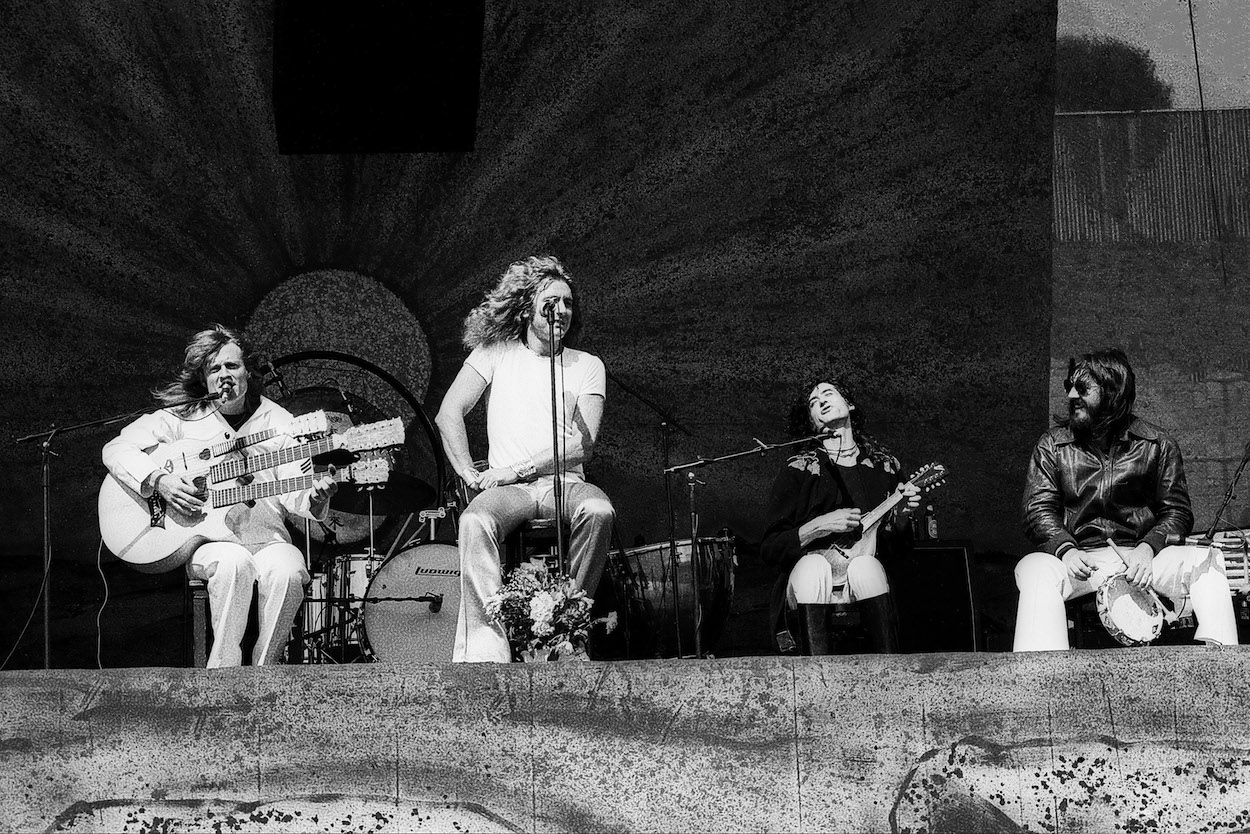Led Zeppelin proved to be exceptional workers in the studio. And we don’t just mean Jimmy Page and John Paul Jones being in-demand session musicians before playing together in the studio. Led Zeppelin’s debut album came together incredibly quickly. They made the most of limited downtime and sporadic studio visits to create Led Zeppelin II. But the making of Led Zeppelin III inspired the song “Kashmir” by starting a domino effect that culminated in the band’s definitive song.
Jimmy Page said Led Zeppelin found inspiration in traveling
Led Zeppelin released two albums in 1969 and almost endlessly crisscrossed the Atlantic Ocean for concerts for 18 months after forming. They had no choice but to write songs for their second album while they toured. The group didn’t stop moving even when they were off the road.
When the band finally had some downtime — they went two months without playing live in mid-1970, per the Led Zeppelin website — Jimmy Page and Robert Plant kept traveling. They vacationed together in a small cottage in Wales. They found inspiration in traveling to a new location.
“When Robert and I went to Bron-Yr-Aur, it wasn’t like it was, ‘Let’s go down to Wales and write,” Page told Light & Shade author Brad Tolinski. “The original plan was to just go there, hang out, and really appreciate the countryside. The only song we really finished up there was “That’s the Way,” but being in the country set a tone, and it established a standard of traveling for inspiration.”
The band retreated to rural settings (namely Headley Grange and Mick Jagger’s Stargroves estate) to record Led Zeppelin IV, Houses of the Holy, and Physical Graffiti. Traveling to Wales before making Led Zeppelin III started a chain reaction that inspired “Kashmir.”
How writing ‘Led Zeppelin III’ while traveling led us to ‘Kashmir’
It led to incredible music on the albums, but Plant regretted sacrificing a more stable family to tour so frequently with Led Zeppelin. Still, the standard of traveling for inspiration snaked from Led Zeppelin III to “Kashmir.”
Page and Plant headed to India in 1972 to record with native musicians. They performed “Friends” and “Four Hands” (a rendition of “Four Sticks”) with the Bombay Orchestra, and the results finally saw the light of day in 2015 on the Coda deluxe edition reissue. Years after using tablas on “Black Mountain Side” from Led Zeppelin I, the band played their songs alongside a full-fledged band of Indian musicians.
Page had his escalating guitar riff committed to tape before Led Zeppelin started writing “Kashmir” in earnest. John Paul Jones composed the orchestral parts on “Kashmir.” Even though he wasn’t in India, you can hear the link between “Four Hands” (via YouTube) and “Kashmir.”
Plant’s travels inspired his “Kashmir” lyrics. A road trip through Morocco in 1973 provided the basis. The desert imagery he sings about owes itself more to his Western Africa sojourn than the lush meadows and tropical areas of the Kashmir region’s more accessible locations. Writing the words had Plant virtually in tears, but he came through in spades with timeless lyrics. Once again see how the traveling that started with Led Zeppelin III eventually inspired “Kashmir.”
Page and Plant said ‘Kashmir’ is Led Zeppelin’s signature song
Robert Plant joined Rick Rubin on the Broken Record podcast. In the latest episode RP discusses “Raise The Roof”, writing “Kashmir” with Jimmy Page after a trip to the Sahara in the early ’70s, meeting John Bonham as a teenager and more.
To Plant, the explorations he and Page took in North Africa — the seeking you hear in his lyrics — elevated “Kashmir” to be Led Zeppelin’s signature song.
“It’s the quest, the travels and explorations that Page and I went on, well off the beaten track,” he once told Rolling Stone. “It was quite a remarkable time, to open your eyes and see how Berber tribesmen lived. That’s what it was like for me then. That, really, to me, is the Zeppelin feel.”
Page and Plant don’t always see eye-to-eye on their band’s legacy, but the guitarist agrees that “Kashmir” makes the shortlist as Led Zeppelin’s definitive song.

